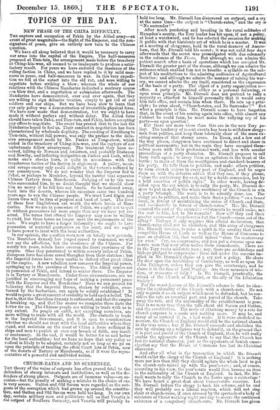TOPICS OF THE DAY.
NEW PHASE OF THE CHINA DIFFICULTY.
Tine capture and occupation of Pekin by the Allied army—an event of great magnitude—the flight of the Emperor, and the non- signature of peace, give an entirely new turn to the Chinese question. We have all along believed that it would be necessary to carry our arms into the capital of the Empire. The half-measures
proposed at Tien-tsin, the arrangement made before the treachery at Ching-kia-wan, all seemed to us inadequate to produce a satis- factory result. For years we have endured the insolence of the ruling faction in China, and we have replied to it by mild mea- sures in peace, and half-measures in war. In this very expedi- tion we fell at the outset into the old rut, and were willing to negotiate before striking a blow ; whereas the whole of our relations with the Chinese Mandarins indicated a contrary course —a blow first, and a negotiation or submission afterwards. The Mandarins have demonstrated, over and over again, that they are willing to sign delusive treaties, simply to get rid of our soldiers and our ships. But we have been slow to learn that our only policy was a demonstration of irresistible physical force. We have now made that demonstration, but we ought to have made it without parleys and without delay. The Allied force should have taken Taku, and Tien-tsin, and Pekin, before accepting any offers to negotiate. The event has proved that to the last the Mandarins hoped to fool us. Their conduct in negotiation has been characterized by wholesale duplicity. The sending of Kweiliang to Tien-tsin, without full powers, was only the preface to the delu- sive arrangement made by Mr. Parkes at Tung-chow, which ended in the treachery of Ching-kia-wan, and the capture of our unfortunate fellow countrymen. The treatment they have re- ceived, killing de Norman and Anderson, and probably Brabazon and Bowlby, and inflicting indignities on Parkes and Loch, which make one's cheeks burn, is quite in accordance with the treacherous tactics of the faction in diplomacy. A paltry, mean, and savage enemy only could delight in the tortures suffered by our countrymen. We do not wonder that the Emperor fled to Zehol, or perhaps to 3Ioukden, beyond the barrier that separates Chinese Tartary from Manchoaria. Judging of us by the men who surrounded him, he no doubt thought that we should show him no mercy if he fell into our hands. So he hastened away, back into the deserts, whence his ancestors came two hundred years ago to vex the Chinese people. We trust Lord Elgin and Baron Gros will be firm of purpose and hard of heart. The lives of those four Englishmen are worth the whole horde of Man- darins. Now we are in possession of Pekin, we ought not to quit it without guarantees far more ample than any we have yet ex- acted. The terms first offered the Emperor may now be willing to yield, but those terms no longer met the requirements of the case. We ought to have a larger indemnity ; we ought to have possession of material guarantees on the coast, and we ought to have power to treat with the local authorities. In our opinion, the question rests now on totally new greunds. The Mantchou dynasty has longed ceased to command, we will not say the affections, but the obedience of the Chinese. For nearly ten years, rebels have overrun the finest provinces of the empire. Once they penetrated to within seventy miles of Pekin. European force has alone saved Shanghai from their clutches ; but the Imperial forces have been unable to defend other great cities of the empire. A new rebellion now menaces the Imperial power, springing up in the province of Shen-se. The Allied armies are in possession of Pekin, and intend to winter there. The Emperor is in Tartary or Manchouria. Under these circumstances, are we justified in encouraging any hope of making a permanent peace with the Emperor and the Mandarins ? Have we any ground for believing that the Imperial throne, shaken by rebellion, over- turned by the barbarians, can again be solidly established ? It would require a great amount of credulity to hold such a belief. The fact* that the Mantehou dynasty is exhausted, and that the empire is breaking up, and that the sooner we recognize these facts the better for us. The Chinese people are willing to trade with us to any extent. No people on earth, not excepting ourselves, are more willing to trade with all the world. The obstacle to trade is the Imperial Government, and it is open to consideration whether we should not treat with the local authorities where they stand, and maintain on the coast of China a force sufficient in ships and men to punish at once any breach of faith, any insult or contumacy. In the end, it would be better for us and better for the local authorities; but we have no hope that any policy so radical is likely to be adopted, certainly not so long as we go on upon the principle of treating the effete Court late of Pekin, now of the deserts of Tartary or Manchouria, as if it were the repre- sentative of a powerful and undivided nation.


























 Previous page
Previous page